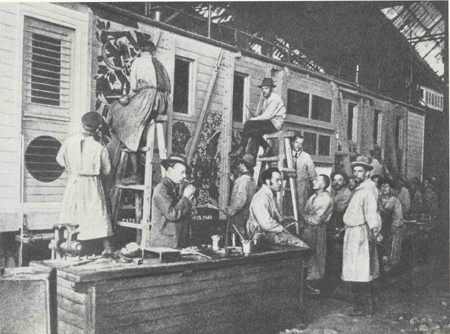Anna Baumgart – The Conquerors of the Sun

*** German version below ***
Opening Satuday, March 31, 2012, 7 p.m.
Talk with Jörg Heiser and Anna Baumgart, 9 p.m.
Duration March 31 – May 12, 2012
The Conquerors of the Sun (2012) is the most recent film project by Anna Baumgart, who is living in Warsaw. She has invited the historian of the avant-garde and art critic, Andrzej Turowski, to participate in it. His book, The Locomotive of History, is an integral part of the project. Together they recreate the history of the propagandistic train which was supposed to get in 1920 from Russia via Poland to Berlin in order to support the German Communist Party, and to transport the ideas of the revolution to the West. In the years after the October Revolution in 1917 the propagandistic trains gained popularity, they transformed the public sphere and symbolised modernity. Like “moving images”, they trespassed the country, inside the wagons exhibitions, lectures and discussions were organised.
Baumgart's film combines clippings from artistic and documentary films of the 1920th, reports of Turowskis research, interviews with other scientists dealing with the Russian and Polish avant-garde, as well as images from the media of today. The film speculates about the disposition of the train and the political and artistic aims related to it. Not only Russian artists, such as Kazimir Malevich and El Lissitzky, were involved, but also the Polish avant-gardists Katarzyno Kobro, Władysław Strzemiński and Henri Berlewi.
The Locomotive of History is neither an academic treatise nor a literary fiction, and The Conquerors of the Sun is neither a documentary nor a feature film. Both can be located at the margins not only of genres, but also of the “grand narrative” about art and politics. Turowski and Baumgart prove that today the very distinction between fact and fiction is being suspended, they are highlighting the importance of imagination for creating (art) historical narration as well as political and social utopias.
The title of Baumgart's film refers to the Futurist opera The Victory over the Sun, staged in 1913 in St. Petersburg. Taming the sun, and thus disrupting the linear flow of time, was supposed to become the symbol of a total destruction of the existing order. Insofar the opera anticipated the revolution of 1917. The libretto by Aleksei Kruchonych and the prologue by Velimir Chlebnikov were written in the avant-garde language, ZAUM, which can be heart in Baumgart's film as well.
“The revolution continues worldwide” claims a slogan of the Occupy Wall Street movement. By including images of their protest marchs in her film, Baumgart refers to the recent political reality.
The exhibition is organized in cooperation with lokal_30 and supported by the Stiftung für Deutsch-Polnische Zusammenarbeit.
Image: Artists painting a wagon, 1920, press image, archive Andrzej Turowski.
![]()
Eröffnung Samstag, 31. März 2012, 19 h
Talk Jörg Heiser im Gespräch mit Anna Baumgart, 21 h
Laufzeit 31. März – 12. Mai 2012
The Conquerors of the Sun (2012) ist das neuste Filmprojekt der Warschauer Künstlerin Anna Baumgart. Sie hat den Avantgarde-Historiker und Kunstkritiker Andrzej Turowski eingeladen, sich an dem Projekt zu beteiligen. Sein Buch, The Locomotive of History, ist integraler Bestandteil des Projekts. Gemeinsam rekonstruieren sie die Geschichte des Propagandazugs, der 1920 von Russland durch Polen nach Berlin fahren sollte, um die deutsche Kommunistische Partei zu unterstützen und die Idee der Revolution im Westen zu verbreiten. In den Jahren nach der Oktoberrevolution 1917 genossen die von Konstruktivisten und Suprematisten gestalteten Propagandazüge große Popularität, sie veränderten den öffentlichen Raum und standen für Modernität. Wie „bewegte Bilder“ durchquerten sie das Land, in ihrem Innern wurde Ausstellungen, Vorträge und Diskussionen organisiert.
Baumgarts Film kombiniert Sequenzen aus Kunst- und Dokumentarfilmen der 1920er Jahre, Berichte von Turowskis Recherche, Interviews mit anderen Wissenschaftlern, die zur russischen und polnischen Avantgarde forschen, sowie Bildmaterial aus den Medien von heute. Der Film stellt Hypothesen über den Verbleib des Zugs und über die mit ihm verbundenen politischen und künstlerischen Ziele auf. Involviert waren nicht nur russische Künstler wie Kazimir Malewitsch und El Lissitzky, sondern auch die polnischen Avantgardisten Katarzyno Kobro, Władysław Strzemiński und Henri Berlewi.
Ebenso wie man The Locomotive of History weder als wissenschaftliche Studie noch als literarische Fiktion bezeichnen kann, ist The Conquerors of the Sun weder Dokumentar- noch Feature-Film. Beide loten die Grenzen von Genres, aber auch von der „großen Erzählung“ über Kunst und Politik aus. Turowski und Baumgart zeigen, dass sich der Unterschied zwischen Fakten und Fiktion heute aufgelöst hat, sie beleuchten die Bedeutung der Imagination für die (Kunst)Geschichtsschreibung wie für die Entstehung politischer und sozialer Utopien.
Der Titel des Films bezieht sich auf die futuristische Oper Sieg über die Sonne, die 1913 in St. Petersburg uraufgeführt wurde. Die Sonne zu zähmen und die lineare Zeitrechnung zu überwinden, galt als Symbol für die totale Destruktion herrschender Ordnungsgefüge. Insofern nahm die Oper die Revolution von 1917 künstlerisch vorweg. Das Libretto von Aleksej Krutschonych und der Prolog von Velimir Chlebnikov waren in der irrationalen Avantgarde-Sprache ZAUM verfasst, die in Baumgarts Film auch zu hören ist.
„The revolution continues worldwide“ behauptet ein Slogan der Occupy Wall Street Bewegung, und indem Baumgart Bilder von deren Protestmärschen in ihren Film integriert, stellt sie einen Bezug zur gegenwärtigen politischen Realität her.
Die Ausstellung ist eine Kooperation mit lokal_30, Warschau und wird unterstützt von der Stiftung für Deutsch-Polnische Zusammenarbeit.
Bild: Künstler bemalen einen Wagon, 1920, Pressebild, Archiv Andrzej Turowski.
![]()